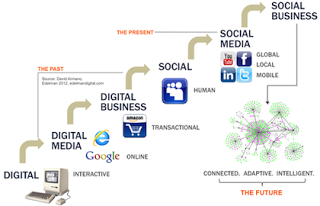Even wat luchtigs: dit is een leuke parodie op alle hyperige sociale media-filmpjes.
Bron: The Next Web
Even wat luchtigs: dit is een leuke parodie op alle hyperige sociale media-filmpjes.
Bron: The Next Web

Vandaag is PICNIC Mashup, een voorproefje van het PICNIC-festival.
Het was een ochtend met een hoop inspiratie en slimme uitspraken.
Andrea Mallard van IDEO gaf een presentatie over het geheim van het succes van het legendarische designbedrijf.
Haar stelling was dat IDEO niet zozeer succesvol is dankzij Design Thinking, een principe waarover inmiddels bijbels vol zijn geschreven. Het geheim zit ‘m in de werkcultuur.
Deze is kortgezegd open en speels. Mensen bij IDEO huilen, spelen, delen zonder te claimen, zagen gaten in muren en schieten pijltjes op gasten. En ze doen dit allemaal zonder toestemming te vragen.
Dit resulteert in een inspirerende werkcultuur. En juist die zorgt voor de productiviteit.
Kortom: de principes die in de boeken staan, zijn meer het resultaat dan de oorsprong. Het is dus wat onzinnig om proberen de resultaten te imiteren, zonder de juiste stimuli te geven.
Of, zoals ze zelf zei: “Understanding is not the same as internalizing.”
Het goede nieuws is dat dit motiveert om kennis te delen. Weten is iets anders dan kunnen. De angst is dat anderen er met je idee er vandoor gaan, is dus wat onzinnig. Het gaat niet echt om de kennis.
Maar dat voelt ook als het slechte. Want innovatieve principes als Design Thinking zijn dus een stuk moeilijker te imiteren dan de mooie modellen en boeken sugereren. En wat is daarmee de waarde van puntige wijsheden?

Stefan Olander, marketingbaas van Nike, doet regelmatig scherpe uitspraken. Bijvoorbeeld over de introductie van Nike+, waarbij hij vertelde dat Nike+ geen product was, maar een marketinginstrument.
Nu vat hij mooi de tekortkomingen van marketing op sociale media samen. Merken focussen zich teveel op ‘likes’.
“A whole industry is stuck on trying to force old metrics on to new channels.”
“Too many businesses are thinking ‘I need to sell inventory’, rather than ‘How can I add value to a smartphone, or a new device?'”
“Advertising is an old model that is being squeezed into the new framework of social media, when the fact is that people don’t want to be interrupted.”
Volgens Olander is Google AdWords het enige commerciële model dat een bewezen success heeft.
Nike is al een tijd geleden weggestapt van reclame. Het focust zich op brand-utilities als Nike+.
“Once you have established a direct relationship with a consumer, you don’t need to advertise to them”.
Bron: Marketing magazine

David Armano beschrijft in een artikel de vijf stadia die vooraf zijn gegaan een ‘social business’: digitaal, digitale media, digitaal ondernemen, sociaal en sociale media.
Vooral zijn visie op ‘social business’ vind ik interessant:
“Despite much of the chatter around “social business”, the reality is that most organizations are currently dealing with the realities of social media and only a few truly recognize the potential of social business.
Not unlike how digital media evolved into digital business—social business takes the foundation of social media and begins to build new economic models on top of it. Proof points include models such as Kickstarter which disrupts old economic models by empowering any venture to become a funded venture.
Existing business models however, are also presented with new opportunities (and threats). Business models where new connections are formed to the benefit of both the business, customer and even employee and shareholders are a core tenet of “social business”.
One could make the argument that Apple, while infamous for it’s secret culture acted as a social business when they chose to connect to would be developers instead of trying (in vain) to design apps themselves.
It is this kind of connected ecosystem which is linked to the idea of social business as well as the ability to adapt to conditions based on the intelligence a business can interpret.
In the immediate years to come, the amount of data available to the average business will be infinite, however the data will be meaningless without the ability to interpret and act upon it.”
Bron: Logic+Emotion